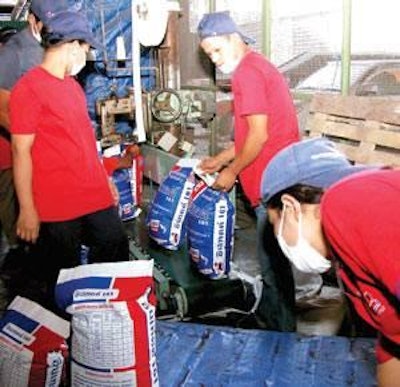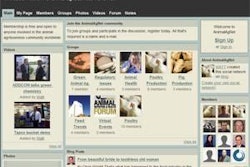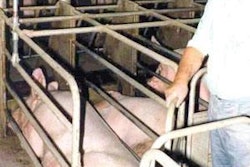
Thailand offers an impressive record of triumphs over many adversities besetting animal and feed industries in recent years. Within the past decade, these successes include recovery from the Asian economic crisis of the late 1990s, rebuilding from the 2004 tsunami, and success in controlling human-lethal bird flu. Compared to many other countries, Thailand's animal and feed industries appear to have coped well with the impacts of H5N1 avian influenza, flock quarantine and culling, poultry export restrictions, and many other problems. Surviving these traumas, today the country of 65 million in Southeast Asia enjoys even more technically advanced and export-oriented animal and feed industries.
Among the entrepreneurs with a vision for greater feed and food industry growth in Thailand is Dr Wiboon Lapjatupon, whose leadership of a 7-year-old company is pushing a new wave of Thai aquafeed innovation and product development. Inteqc Feed Co Ltd, part of the Inteqc Group, maintains headquarters in Bangkok and production facilities 40 km south at Samutsakhorn.
New wave of innovation
Grown from a partnership of animal industry professionals begun in the 1980s, today Inteqc is one of Thailand's top three aquafeed manufacturers, with an estimated 16% share of the Thai shrimp feed market, as well as growing positions in larval and hatchery feeds and fish feeds. Shrimp feed production continues to dominate Inteqc tonnage, with production capacity of 9,000 tonnes per month (tpm) in 2005, projected to average 11,000 tpm in 2006 as new production lines come on-line at mid-year for output of up to 15,000 tpm. At the same time, Inteqc's high value larval shrimp and hatchery feed productswith current capacity of about 3,000 tpmare increasing in proportion of company turnover.
Currently, the Inteqc feed product range includes a number of brands: Inteqc, Diamond, and Shrimp First for tiger shrimp (Penaeus monodon); Starteqc and Wave for gulf white shrimp (P vannamei); Neo Feed and Vanamax as feed supplements for these species of marine shrimp; and Fresh for freshwater prawn (Macrobrachium rosenbergii). For fish, Inteqc manufactures and markets brands Fish Choice and Fish Mate and the new Fish First brand.
"Inteqc fish feed," Dr Wiboon Lapjatupon told FEED INTERNATIONAL recently, "compliments our shrimp feed because many of our agents already market fish feed."
Launched in March this year, the Fish First product range includes sinking and floating pellets for herbivorous fish including carp (Cyprinus spp and others) and the main omnivorous species, tilapia (Oreochromis spp). Inteqc's expansion into both hatchery and fry feeds, as well as lower-price grow-out feeds, represents just the current instar' of growth of the company conceived more than 15 years ago.
Challenging start-up
In the late 1980s, having received his doctorate in poultry nutrition from the University of Nebraska in the USA, Dr Wiboon Lapjatupon was practicing poultry nutrition in the Thai poultry industry. Thailand's poultry feed industry was booming at that time and the country's big broiler chicken integrators were expanding rapidly in the domestic market while entering export markets. This situation led the Thai poultry nutritionist and his veterinarian brother, Dr Wichai Lapjatupon, and a friend of his brother, Dr Preecha Ekthumasuit, to look beyond the poultry industry for feed-related opportunities. The three started up Livestock Agricultural Business International Co, Ltd (LABI), which eventually led to the formation of the Inteqc Group of companies. The nutritionist partner visited Taiwan and saw the country's big business in farmed shrimp.
"At that time," Dr Wiboon Lapjatupon says, "Taiwan was the biggest shrimp producer in the world. But I envisioned that Thailand could do it better."
With a small amount of capital, the Thai group first imported complete shrimp feed made in Singapore to be sold in Thailand. But they soon lost almost all the start-up money. Dr Wiboon Lapjatupon recalls, "We learnt a big lesson from that and decided to start with feed additive products because we didn't have enough money for the feed business."
LABI's aquaculture feed additives turned out to be the room that nobody touched'. Expanding the business with poultry and pig feed additives and veterinary products, the company yielded better profits, which enabled other company start-ups. Prima Tech Co, Ltd, was established in 1993 to manufacture and market water quality test kits and water monitoring equipment for the growing Thai shrimp industry. Since then, Prima Tech has expanded into food sanitation, food ingredients, and food additives. In 1994, Lab Inter Co, Ltd, was established to specialise in marketing and distribution of feed additives and nutritional supplements for terrestrial animals, including poultry, pigs, ruminants, and pets.
Aquafeed specialist approach
By the mid-1990s, the LABI companies held a solid, high-profile reputation, based on experience, know-how, and technical capability. In 1999, the Inteqc Group was established and a logo was created in order to represent the group and all of its related activities. At the same time, Inteqc Feed Co was created to manufacture and market shrimp feed.
At first, Inteqc bought feed from another company and put it in Inteqc's bags. However, within three months, Inteqc was selling more than its partner.
"We sold 1,700 tons from the capacity of 2,000 tons per month," Dr Wiboon Lapjatupon says, adding: "We distributed a free magazine to the farmers to educate them and give them a lot of knowledge."
Inteqc then constructed its Samutsakhorn plant, starting with production lines for pelleted shrimp feeds. In 2003, Inteqc implemented its balanced scorecard system' of quality assurance at all levels of formulation, production, and distribution. In 2004, the company's feed production was certified for ISO 9001, GMP (good manufacturing practices), and HACCP (hazard analysis and critical control points). Also, in 2004, the company expanded pelleting capacity and installed new feed flaking equipment for both larval shrimp and hatchery fish production.
Meanwhile, the Inteqc Group established its own wet-chemistry laboratory and experimental farm to carry out research and development in aquafeeds and other products.
In January this year, Inteqc's Samutsakorn plant began manufacturing a new range of sinking fish feeds, produced on one of its pelleting lines. In February, Inteqc installed an extrusion line in order to produce floating fish feeds.
The plant's machinery includes IDAH Machinery Co equipment from Taiwain. Aquafeed plant manager Narath Plyhirun notes that the Taiwanese company's experience in aquafeed processing enabled configuration of the Inteqc plant to be flexible in manufacturing its customers' formulas and product form preferencesfrom raw materials intake to packaging.
Inteqc's floating extruded products for tilapia were launched in the Thai market in March, in advance of the international aquafeed seminar in conjunction with the Victam Asia international feed industry trade show in Bangkok. Other Inteqc products have entered export markets for Malaysia, Vietnam, Indonesia, and Myanmar. Dr Wiboon Lapjatupon has discussed expanding into China, which is the world's largest aquaculture market.
"However," the Thai aquafeed entrepreneur says, "we cannot count on the feed export market." He explains that it is necessary to know local conditions in detail in order to grow aquafeed and other feed businesses. To compete most successfully, he adds, "We would have to build our factory abroad."
‘Aqua food' integration
But Dr Wiboon Lapjatupon believes the Inteqc Group has a number of growth opportunities at home in Thailand. Already, Inteqc Group is moving to become more integrated in the aquaculture food chain'. For example, the capacity to produce high-quality larval shrimp, fry fish, and hatchery feeds enables integration at the hatchery level. Instead of integrating growout shrimp farms, Inteqc currently produces 200 million larva per month and plans to yield 1 billion larva per month within two years. Also, in coming years, the Inteqc Group plans to establish a processing plant for shrimp and fish products for export markets.
Beyond aquaculture, Inteqc Group sees opportunity in other species. Dr Wiboon Lapjatupon notes that, "The cost of entry for broiler feed is too high. It is hard to compete with existing companies."
However, like aquaculture, Thailand's pig feed industry, has enjoyed new investment even as bird flu' has helped to cool the market for poultry feeds. Dr Wiboon Lapjatupon particularly notes a potential niche market in piglet feeds: "I don't think most of the companies are doing a good job in piglet feeds."
In any case, further developing the food chain' is the biggest dream of the Thai feed and food industry innovator: "A brand name food chain like McDonalds, acknowledged not only in Thailand, but also throughout the world.


.jpg?auto=format%2Ccompress&fit=crop&h=167&q=70&w=250)














